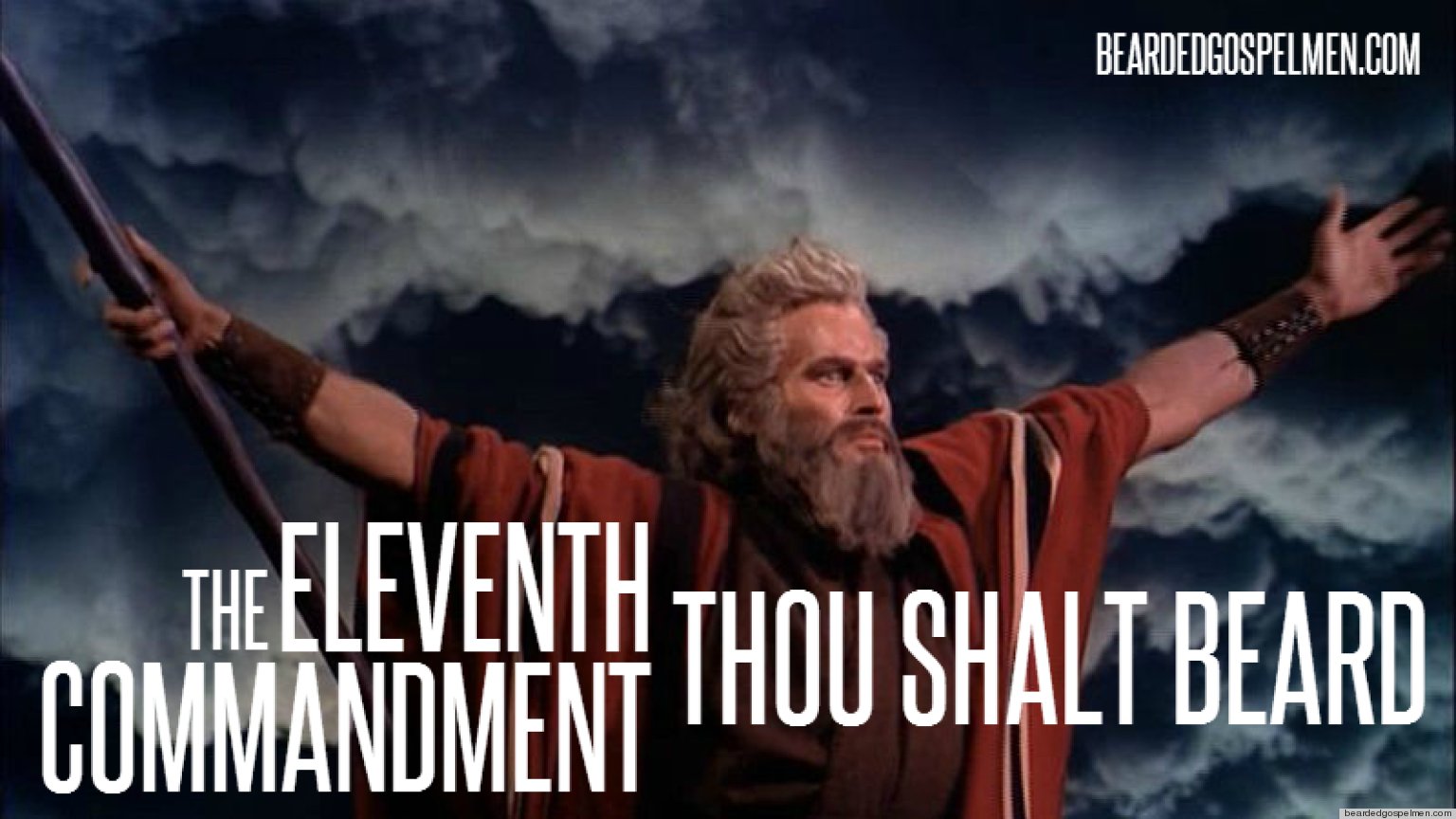So, there's a growing trend I've noticed over the past few years or so in Reformed circles that never ceases to amaze me. It's a trend that is growing at an alarming rate, it is rarely cleaned, trimmed only when necessary, and has many men all over the country covering their faces. Reformed theologians around the country are calling it quits when it comes to shaving. It's a growing trend that is becoming synonymous with reformed theology. Nationally, the sale of Gillette razors has plummeted as more and more men sport a long, scraggly, and unkempt beard in Duck Dynasty fashion (shaving cream sales remain steady as bearded men utilize the product for "smack cam" videos that are wildly popular on YouTube).<-----Not making this up: click here.
Nothing is more manly than beards. It separates the men from the boys. It separates the manly men from the sissy, girly men. It was once a rite of passage for a father to teach his son to shave, but not anymore. Now, the rite of passage entails the son's ability to sport facial hair that covers his entire face and the father to acknowledge the density and quality of his hair follicles. Beards are in. Skin is out. The only thing that should be as smooth as a baby's bottom in reformed circles is a baby's bottom.
Obviously, there is a biblical theology of men having beards. It's scriptural. Throughout scripture, almost every time beards are mentioned it is in reference to men. There is that troublesome passage in Leviticus 13:29-30 that states that, "When a man or a woman has a disease on the head or the beard, the priest shall examine the disease." Undoubtedly, it is understood that Israelite women did not have diseases in their beards. They didn't have beards, of course. It is only a matter of silly sentence structure, really. This passage is not at all implying that women could have a beards. That's plainly absurd. Therefore, men touting beards is biblical.
There is a very popular quote circulating around reformed circles by Charles Spurgeon, in which the Prince of Preachers lectures his pupils to grow their beards in order to protect their throats from colds because beard growing is, "A habit most natural, scriptural, manly, and beneficial." This important bit of advice for preachers follows this equally important direction:
If any of you possess delightfully warm woolen comforters, with which there may be associated the most tender remembrances of mother or sister, treasure them — treasure them in the bottom of your trunk, but do not expose them to any vulgar use by wrapping them round your necks.
(Of course, no beard touting preacher would be caught dead with a woolen comforter knitted by mother wrapped around their neck. This was obviously advice given to clean shaved boys in the room.)
Beards are for manly men and clean shaven faces are for courageous soldiers or ninnies (talk about different sides of the spectrum). It is widely accepted that a fight between a bearded man and a clean shaven man will always result with the bearded man as victor:
Chuck Norris vs. Arnold Schwarzenegger
Clint Eastwood vs. John Wayne
Karl Marx vs. Immanuel Kant
Abraham Lincoln vs. George Washington
Fyodor Dostoyevsky vs. Ralph Waldo Emerson
Clark Kent vs. Bruce Wayne

Of course, the theological prowess of bearded men is far superior to that of men with little to no facial hair. It is a fact widely accepted in reformed circles. A pastor with a large, scruffy beard is hands down a better preacher than Joel Osteen, Rob Bell, and Pat Robertson (I know that's not Pat Robertson in the picture...ironically, I wrote this before I saw the picture...two out of three). A man with a big, bushy beard knows his theology better than a man without a beard. The bigger the beard, the wiser and more biblical the man. You can tell the difference between a reformed pastor and an evangelical pastor by just looking at their face. The difference is as stark as night and day. Beard vs. no beard. Crystal clear. No questions asked.
There's not room for a lot of pride in reformed circles, so there's hardly any room left for pride after our beard-growing capabilities. We do not boast about much, but if we are going to boast, it's going to be in the cross of our Lord Jesus Christ (Gal. 6:14) and our beards; the gospel and facial hair.
Reformed theology is manly, robust, dense, and healthy just like a good beard. It only makes sense to use beards as the image of good, solid, biblical theology. Nothing says, "I'm reformed," like a good, healthy, dense beard (well, perhaps a refrigerator full of microbrews or a cabinet full of imported coffees).
If you're reformed and you know it, grow a beard. (If you're a woman, don't worry about it.)
But seriously, I hope that's not how the reformed church is perceived. After all, what's up with the beard-lore in reformed circles? At first I found it amusing and satirical, but now it has me kinda worried (just a little, though). I am just as guilty as everyone else about this beard craze (or beard praise). I've had a beard since I started college in 2005. Honestly, I didn't grow one because I was trying to demonstrate my masculinity but I got too lazy to shave. After I got married, my wife forbade me from shaving my face. I did once. That was not a good idea.
One of my pastors has been modeling a huge follicle monstrosity for years, and although many in our congregation found it disturbing at first, it's grown on a lot of us (not to mention on him...literally). Naturally, an informal beard-growing competition took place amongst many of the younger men in our congregation. Taking our pastor's lead, we each tried to see how long our beards would grow. Mine didn't get very long before it started to drive me insane with its incessant itching. Over the years, several young men have joined our church. When they first started coming they didn't have beards. Now, no shave November was almost a year ago, and they still haven't shaved.
There seems to be a daily barrage of beards on my Facebook news feed. Just the other day I saw a pro-beard video and I had to share it with my pastor (don't know why). Beards in reformed circles are like pogs in my elementary school. I don't know why, but you just have to have them and brag about them. If you didn't bring a bag of pogs and at least three genuine, stainless steel slammers to lunch then you were a nobody. I hope the same is not said about beards in reformed circles.
Beard-lore might just be a weird phase that reformed churches are going through. I have noticed that more and more young people are interested in reformed theology because of its theological rhetoric and biblical scholarship. More and more hipsters are flocking to reformed churches not because it's progressive but because it's genuine. Unlike most modern denominations, reformed churches are not catering to young people with flashy, modern, new-age marketing ploys, but rather, they are just sticking to their historical roots as confessional churches. More and more young people appreciate a side of Christianity that takes the Biblical narrative seriously both historically and theologically. They know that the Old Testament is more than a list of names, nations, and laws with a few moral fables intertwined here and there. They know that the New Testament is more than just a bunch of one-liners to be pulled out of context to convey a political agenda. They're happy to find a reformed church that offers them a historical alternative.
The face of reformed theology has changed since I started attending a reformed church. No offense to anyone, but when I first started going to a reformed church I felt like I was in a retirement home. It was full of older, wiser men than my dad who knew their stuff theologically. It was a breath of fresh air compared to the evangelical church we left where more and more people were attending the worship service in their pajamas and fuzzy slippers. Thanks to a growing interest in reformed theology, there seems to be more and more young couples in attendance today. That's a great sign of a growing church. Beards are popular with the younger crowd and hipsters, and as more and more young people join reformed churches, the look and feel of reformed theology will obviously change (on the outside, at least).
There are a lot of images attached to reformed theology that are not a result of purposeful marketing: microbrew aficionados, imported coffee connoisseurs, theological literature fanatics, and large beard growing gurus. To my knowledge, it's not an image that reformed churches sat down, discussed, approved, and tried to market. It just seemed to happen because many reformed believers like beer, coffee, books, and beards.
With that said, there's a danger behind marketing an image or brand. Yes, if people fit your image or if they like your brand then they're more likely to check you out. However, if people feel like they don't fit within your brand's image, then they'll be turned off and go somewhere else. That's not to say that reformed churches are marketing a specific brand or image purposefully, but I can't help but wonder if we're doing it intrinsically. Obviously, we don't want people to check us out because of our hobbies but because of our love for the Lord, our appreciation for His grace, and our preaching of His Word. We might not be able to help it if outsiders view us as bearded, white, middle-class, eggheads that homeschool our children and prefer all-natural foods. Then again, we might.
The beard-lore is all in good fun, and I understand that. However, I think we need to be careful and have bearded fun in moderation (like all things). I don't know that we're alienating others from reformed theology with our beard-lore, but I think it's something to be careful of. As a member of a church plant, I can't help but wonder if our intrinsic image drives people away. I know that you don't have to be a bearded, white, middle-class scholar that feeds your homeschooled children all-natural foods in order to come worship with us. I just want to make sure you know that. We reformed Christians sure can make a big fuss about our beards, but were not fanatics like the Amish. It's all meant for sport, nothing more.
All I'm saying is that we need to make sure what is meant in good fun is understood as only good fun, and nothing more.
As the saying goes: It's all fun and games until someone shaves their beard, then it gets serious.




